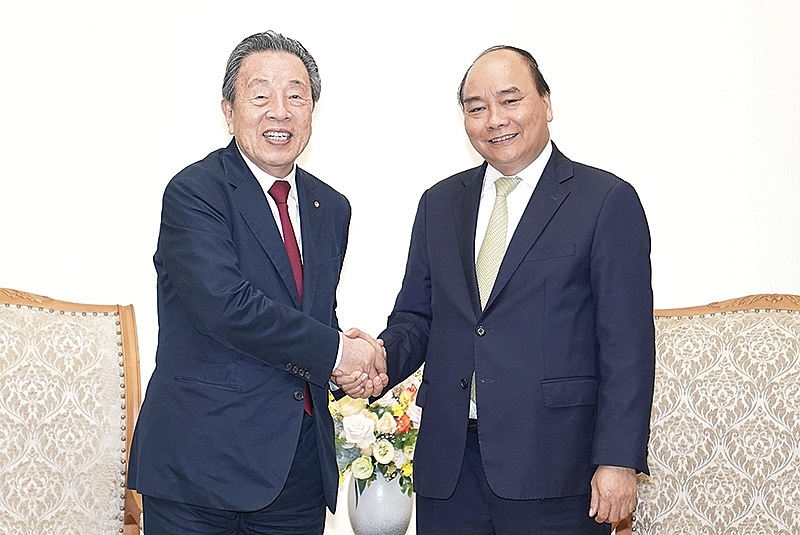Japanese lenders provide solutions
 |
| Japanese Maruhan Group’s chairman Han Chang-woo (left) last week met with Prime Minister Nguyen Xuan Phuc (right) in Hanoi |
Last week, J Trust Group revealed intentions to partner with CBBank, a struggling Vietnamese lender previously mired in a fraud scandal. Nobiru Adachi, senior managing director at J Trust, said that they stand ready to help revive CBBank and has spent considerable time analysing Vietnam’s banking sector. Adachi hoped Vietnamese regulators would facilitate discussions between the two sides soon.
While new to Vietnam, J Trust is not an unfamiliar name in other countries in the region. The bank has run a subsidiary in the Indonesian capital of Jakarta since 2004 and listed this entity on the local stock exchange. Most recently, it opened an investment arm and bought out an Indonesian financial firm, soon after setting up a Singaporean-based fund. J Trust also operates commercial banks in South Korea and Mongolia.
Also last week, Japanese Maruhan Group’s chairman Han Chang-woo met with Vietnamese Prime Minister Nguyen Xuan Phuc, saying that Maruhan is considering a debut in Vietnam, particularly in the financial sector. Maruhan, whose origins start in the family entertainment industry, has experience in running a commercial bank in Cambodia for over a decade, as well as a takeover of a Cambodian microfinance firm. Following its success there, Maruhan also opened new banking businesses in Laos and Myanmar.
These offers from J Trust and Maruhan are an important milestone in Vietnam’s quest to restructure weak lenders using outside help. In 2015, the State Bank of Vietnam (SBV) had to bail out CBBank by buying it at a notional zero VND, after the bank was found out to be an embezzlement tool for business tycoon Pham Cong Danh. The other two “zero VND” lenders were GPBank and Ocean Bank, which also suffered from negative owner equity and massive amounts of bad debt.
The situation for these banks was so dire that the SBV made an exception to their foreign ownership limit, as specified in Circular No.38/2014/TT-NHNN. In particular, unlike other lenders whose cap for foreign-owned shares stands at 30 per cent, these banks have no limit whatsoever, thus allowing foreign investors to step in and take over the entire business.
At last year’s Vietnam M&A Forum, Deputy Prime Minister Vuong Dinh Hue repeated that Vietnam might not issue new sub-licences for overseas banks in the future, but instead welcome any foreign entity who is willing to buy out weak lenders in the country.
Economist Nguyen Tri Hieu also said, “Foreign partners have the financial capacity and the know-how that will be very helpful to revive Vietnamese banks.”
Over the past few years, a number of suitors have emerged, such as Singapore’s United Overseas Bank, the Asian Development Bank, and the International Finance Corporation. Last year, an Asian financial firm was also rumoured to be holding in-depth talks with Ocean Bank. However, so far, no deal has been signed yet as the three “zero banks” continue their revamp.
Japanese lenders are also warmly welcomed in Vietnam with Mizuho, Bank of Tokyo-Mitsubishi, and Sumitomo Mitsui all becoming strategic partners of major lenders Vietcombank, VietinBank, and Eximbank respectively. Most recently, other Japanese financial firms such as Saison and Shinsei also shook hands with Vietnam’s HDBank and Military Bank for joint ventures in consumer finance.
According to Hieu, the partnership is a win-win situation for both sides. While the Vietnamese banks can come back to life thanks to the international experience and deep pockets of Japanese partners, the financiers themselves will benefit from the investees’ domestic presence, which includes human resources, branches, and an existing client base. Full ownership, as a result, is crucial for Japanese banks to become invested in the restructuring process.
However, this process may turn out to be a long and arduous one for Japanese investors. All of the three zero banks have a colossal number of sour debts: CBBank with VND18 trillion ($782.6 million), or 95 per cent of its outstanding loans; Ocean Bank with VND14.2 trillion ($617.3 million), or 72.3 per cent of all debts and lastly, GPBank with VND2.8 trillion ($121.7 million) or 59.3 per cent. According to the State Audit Office of Vietnam, in 2018 the business prospects of these three banks remained grim, with dismal financial figures and unsolved bad debts. Some of the debts are tied to lawsuits which are still ongoing for OceanBank and CBBank, and the convicted businessmen may not be able to return all of the embezzled money. These legal complications might slow down the negotiation process that the zero banks have with foreign investors, and some suitors may rather adopt a wait-and-see approach.
Oanh Nguyen, partner at Baker McKenzie Vietnam, said that governance is a big issue for struggling banks in the country. Transparency can make or break a deal, which is why negotiations can only be successful if the Vietnamese side agrees to disclose its entire financial statements and related-party transactions.
What the stars mean:
★ Poor ★ ★ Promising ★★★ Good ★★★★ Very good ★★★★★ Exceptional
Related Contents
Latest News
More News
- Cashless payments hit 28 times GDP in 2025 (February 04, 2026 | 18:09)
- SSIAM and DBJ launch Japan Vietnam Capital Fund (February 04, 2026 | 15:57)
- Banks target stronger profits, credit growth in 2026 (February 04, 2026 | 15:43)
- Vietnam on path to investment-grade rating (February 03, 2026 | 13:07)
- Consumer finance sector posts sharp profit growth (February 03, 2026 | 13:05)
- Insurance market building the next chapter of protection (February 02, 2026 | 11:16)
- NAB Innovation Centre underscores Vietnam’s appeal for tech investment (January 30, 2026 | 11:16)
- Vietnam strengthens public debt management with World Bank and IMF (January 30, 2026 | 11:00)
- Corporate bond market poised for stronger growth cycle (January 28, 2026 | 17:13)
- Vietnam's IPO market on recovery trajectory (January 28, 2026 | 17:04)

 Tag:
Tag:















 Mobile Version
Mobile Version